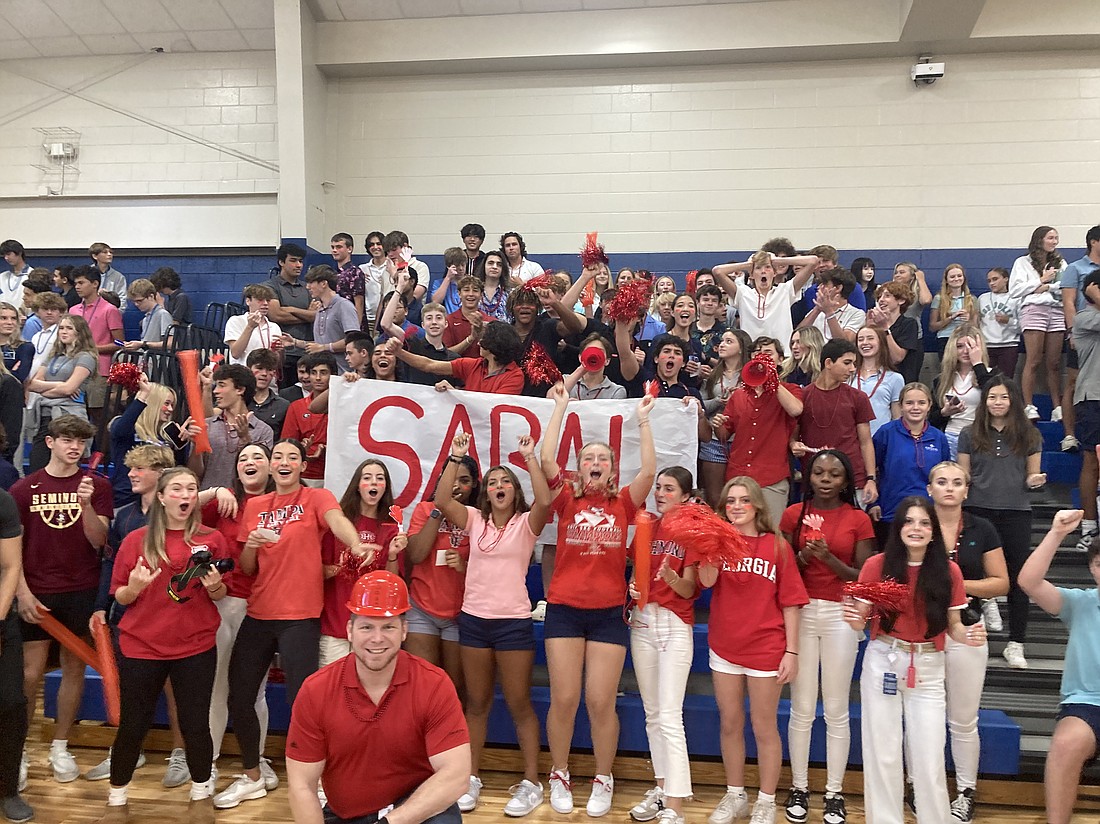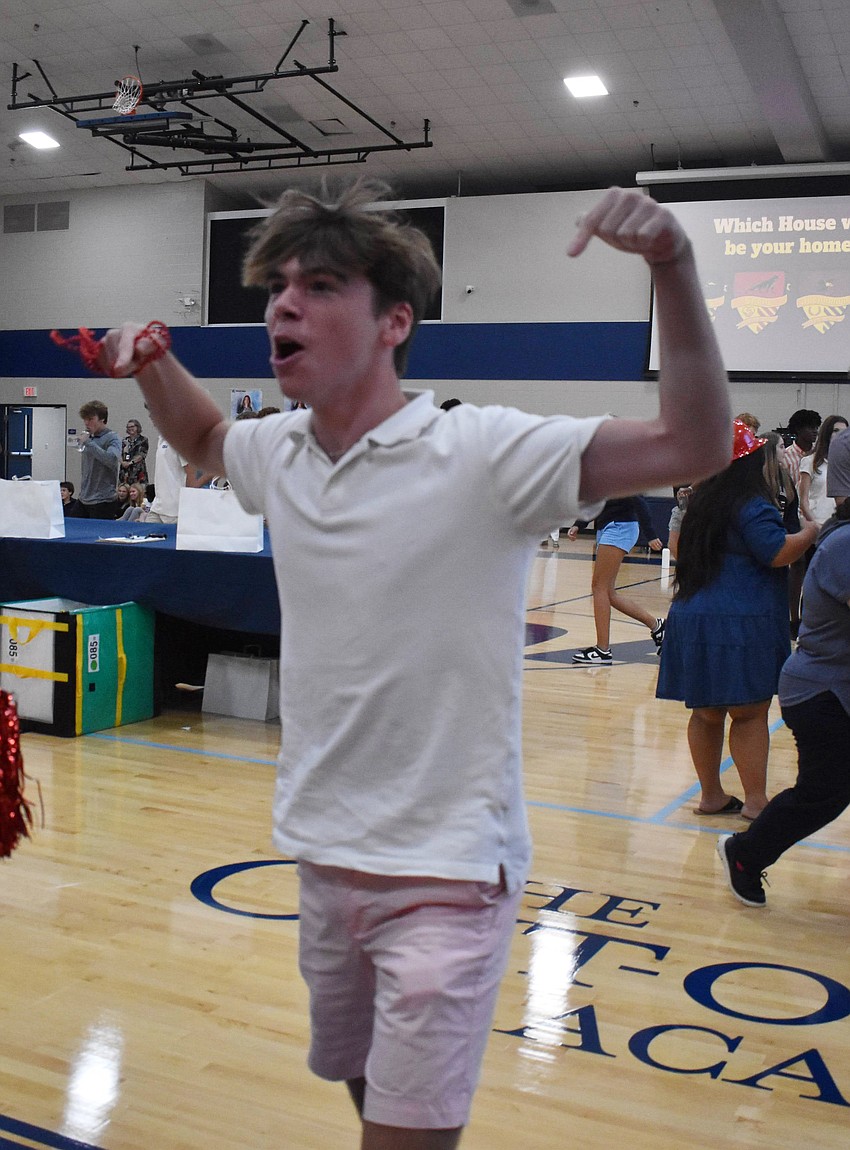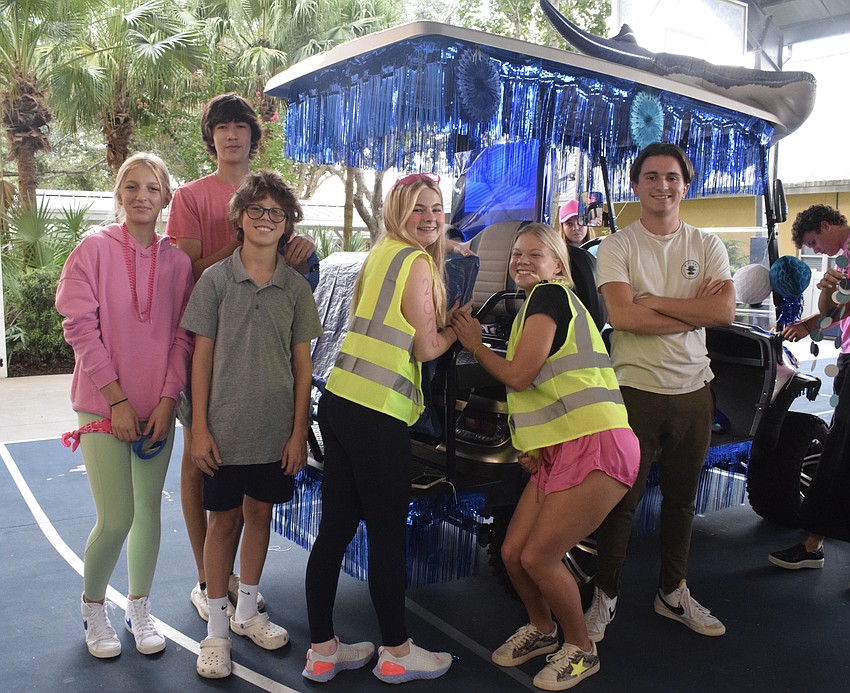- July 18, 2025
-
-
Loading

Loading

Dressed in a purple shirt, shorts and tutu, Max Murphy, a senior at The Out-of-Door Academy, held a giant purple stick he decorated.
Balloons floated into the air in celebration of four more students joining the Jacaranda house.
Murphy, surrounded by dozens of other Jacaranda house students, screamed and banged his stick on the ground to welcome new housemates with open arms during the sorting ceremony for ODA’s new house system.
Excitement filled the air as high school students were assigned to the school's four houses: Cypress, Sabal, Mangrove and Jacaranda.
Although the house system is new to the school this school year, students were quick to embrace it and the new opportunities.
The house system has given ODA more opportunities to continue to create a positive, welcoming culture for its students while offering opportunities for student connection and leadership.

ODA’s house system replaced its Thunder Cup, which had each grade level competing against each other.
The house system mixes all grades together and sorts them into the four houses, giving students an opportunity to meet and get to know each other across the grade levels.
Tim Brewer, the dean of student activities, said unless students participate in extracurriculars or sports, there are fewer chances for underclassmen to interact with upperclassmen.
Having students of all grade levels in each house brings the high school portion of the school together as a cohesive unit. As a junior, Murphy said he couldn’t name any freshmen, but now as a senior through the house system, he knows every person in his house no matter the grade level.
“Coming into the upper school as a freshman is a little scary to be honest,” Murphy said. “This house system, having connections with a senior as a freshman in your house, provides a sense of safety for you. If you have any problems, you can talk to them and you can talk to your house advisors. It’s an easier way to incorporate everyone working together and communicating together.”
Junior Luke Sherry described the houses as a “family within a family.” There’s the ODA family and then his Sabal house family.
Students were involved in the creation of the house system, helping to determine the house names, logos, colors, mascots and more. The various aspects of the houses have a connection to either Florida or The Out-of-Door Academy. For example, each house is named after a Florida tree and each mascot is a Florida animal.
Each house adopted one of ODA’s core values (respect, integrity, excellence and responsibility) and all of them share a core value of service.
The seniors were sorted in their own ceremony the day before the rest of the high school students were sorted. This allowed the seniors to dress in their house colors and bring noisemakers, beads and more to the sorting ceremony for the other students to welcome them into their respective houses.
“We wanted (the seniors) intentionally to be welcoming the other kids to the house and to be those leaders and mentors,” Brewer said.

The house system has created numerous leadership opportunities for students to lead their houses, coordinate social events and service projects, help students academically and more.
Although the Thunder Cup is no longer a tradition at ODA, the competitive aspect of the cup remains. Each house competes in various minute-to-win-it activities or sports tournaments as one way to accumulate points.
Competitions could be cup stacking, musical chairs, gingerbread house decorating, trivia and a lip sync competition.
If a competition needs four students to play, ODA is intentional in requiring a student from each grade level in the house to participate to ensure the entirety of the house is represented and gets students more invested.
Murphy stood proud with a stack of purple cups held above his head as students in the Jacaranda house cheered for him.
Murphy was thrilled not only to have earned 20 points for his house, but he also became a four-time cup stacking champion with this win.
The discontinuation of the Thunder Cup doesn’t mean students’ competitive sides also have dissipated. On the contrary, students said the house system has made them even more competitive.
Students are used to competing against other grade levels, but with the house system, they’re competing against their classmates. For example, during the pumpkin chunking, which is an egg toss competition with small pumpkins, many of the school’s baseball players competed together in this contest in past years. This year, they were competing against each other.

The competitive spirit has led to the usual smack talk.
“I’m looking forward to winning and getting the most points as Sabal house,” Sherry said.
“Second to Jacaranda,” said junior Ethan Atwell before Sherry could finish talking.
Students also can earn points for their houses by participating in house events. Points are determined by the size of the event.
Sabal house students meet on the quad every Monday morning for a Sabal social. If 20 students gather, the event is considered a small house event and Sabal house receives five points.
Jacaranda house had a large house event, “Jaca-crazy Day” when every student in the house dressed in purple and wore a beaded necklace. Each time a Jacaranda student came into contact with a student in their house, they played rock, paper scissors to try to win the other person’s necklace. Prizes were given to those with the most necklaces.
A huge event like Sabal house’s movie night brought students from all four houses together to watch a holiday movie and enjoy popcorn and hot chocolate.
These house events serve as opportunities for students to connect and get to know each other across the grade levels.
The final way students can earn points is through Thunder Bucks. Brewer said to create a culture of positivity and good deeds, teachers were given 10 to 15 Thunder Bucks, which are worth two points, to give to students who demonstrate ODA’s core values. The act could be as small as picking up trash.
“Our hope is it creates the little incentive of the two points for their house to create a culture of kindness, caring, doing the right thing, pitching in and helping out,” Brewer said.
Atwell said the various ways to earn points allows students to contribute to their house in their own way.
“It gives space for everyone to be creative and do what they want to do,” he said.
At the end of the year, the house with the most points will be awarded the Harrison Cup, named after Fanneal Harrison, the school’s co-founder.
But more importantly, the house will have bragging rights.
No matter the house, students always are reminded they are part of one school.
Brewer will call out “Four houses” and students respond “One nation” in reference to Thunder Nation.
“Even though the houses are competing against each other, we don’t want anyone to ever lose sight of the fact we are one Thunder Nation, we’re one school and we all work together,” he said.